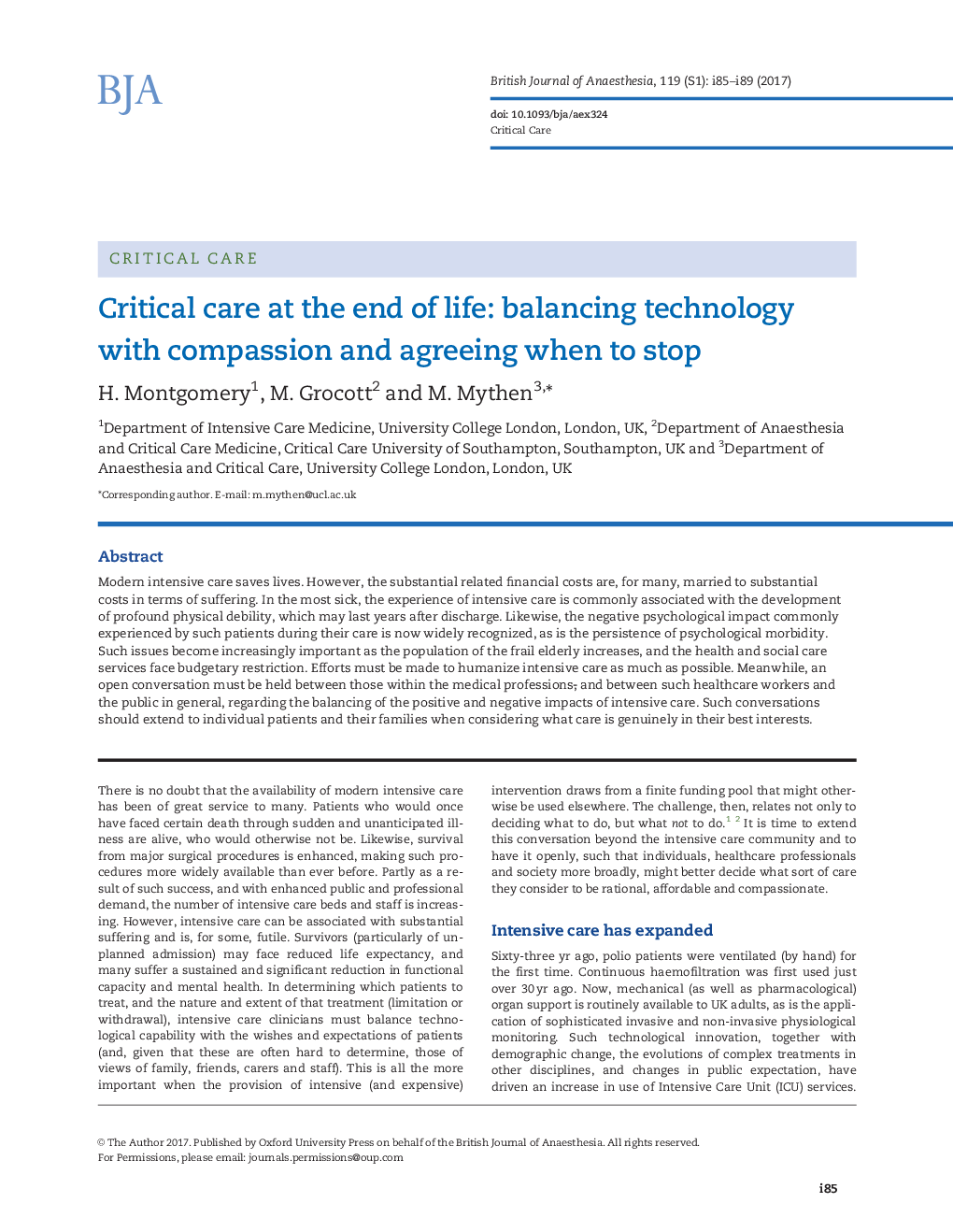| کد مقاله | کد نشریه | سال انتشار | مقاله انگلیسی | نسخه تمام متن |
|---|---|---|---|---|
| 8930228 | 1644516 | 2017 | 5 صفحه PDF | دانلود رایگان |
عنوان انگلیسی مقاله ISI
Critical care at the end of life: balancing technology with compassion and agreeing when to stop
ترجمه فارسی عنوان
مراقبت های حیاتی در پایان زندگی: تکنولوژی متعادل سازی با شفقت و موافقت زمانی که برای متوقف کردن
دانلود مقاله + سفارش ترجمه
دانلود مقاله ISI انگلیسی
رایگان برای ایرانیان
ترجمه چکیده
مراقبت های مدرن فزاینده زندگی را نجات می دهد. با این حال، هزینه های قابل توجه مالی مربوطه برای بسیاری است که از لحاظ رنج ها از هزینه های قابل توجهی برخوردار است. در بیشتر بیماران، تجربه مراقبت های شدید معمولا با پیشرفت فرسودگی عمیق فیزیکی همراه است، که ممکن است سال ها بعد از تخلیه باشد. به همین ترتیب، تأثیر روانشناختی منفی که معمولا در طول مراقبت از این بیماران تجربه می شود، در حال حاضر به طور گسترده ای شناخته شده است، همچنان که ماندگاری بیماری های روانشناختی است. چنین مسائلی به طور فزاینده ای اهمیت می یابد زیرا جمعیت سالمندان ضعیف افزایش می یابد و خدمات بهداشتی و مراقبت های اجتماعی با محدودیت های بودجه مواجه هستند. باید تلاش کنیم که تا حد ممکن مراقبت های شدید را انجام دهیم. در همین حال، گفتگو آزاد باید بین کسانی که در حرفه های پزشکی قرار دارند، و بین کارکنان مراقبت های بهداشتی و عمومی به طور کلی، در رابطه با تعادل تاثیر مثبت و منفی مراقبت های شدید. چنین گفتگو هایی باید به بیماران فردی و خانواده هایشان در هنگام توجه به آنچه که واقعا در بهترین منافع خود هستند، گسترش یابد.
موضوعات مرتبط
علوم پزشکی و سلامت
پزشکی و دندانپزشکی
بیهوشی و پزشکی درد
چکیده انگلیسی
Modern intensive care saves lives. However, the substantial related financial costs are, for many, married to substantial costs in terms of suffering. In the most sick, the experience of intensive care is commonly associated with the development of profound physical debility, which may last years after discharge. Likewise, the negative psychological impact commonly experienced by such patients during their care is now widely recognized, as is the persistence of psychological morbidity. Such issues become increasingly important as the population of the frail elderly increases, and the health and social care services face budgetary restriction. Efforts must be made to humanize intensive care as much as possible. Meanwhile, an open conversation must be held between those within the medical professions-, and between such healthcare workers and the public in general, regarding the balancing of the positive and negative impacts of intensive care. Such conversations should extend to individual patients and their families when considering what care is genuinely in their best interests.
ناشر
Database: Elsevier - ScienceDirect (ساینس دایرکت)
Journal: British Journal of Anaesthesia - Volume 119, Supplement 1, December 2017, Pages i85-i89
Journal: British Journal of Anaesthesia - Volume 119, Supplement 1, December 2017, Pages i85-i89
نویسندگان
H. Montgomery, M. Grocott, M. Mythen,
